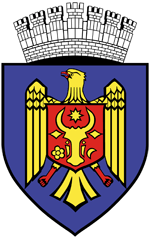Nicolae Bivol
Nicolae Bivol (June 1, 1882 in Ialoveni – after 1941) was a Bessarabian politician, member of the Sfatul Țării between 1917–1918, and Mayor of Chişinău in two terms between 1923–1924 and 1925–1926.[1]
Nicolae Bivol | |
|---|---|
| Member of the Moldovan Parliament | |
| In office 1917–1918 | |
| Mayor of Chişinău | |
| In office 1923–1924 | |
| Preceded by | Gherman Pântea |
| Succeeded by | Vasile Bârcă |
| In office 1925–1926 | |
| Preceded by | Vasile Bârcă |
| Succeeded by | Sebastian Teodorescu |
| Personal details | |
| Born | June 1, 1882 Ialoveni |
| Died | after 1941 |
| Political party | National Liberal Party (1922-1926) |
| Relations | Petru Bivol (father) |
| Alma mater | University of Dorpat |
Biography
Early life
In 1902, Nicolae Bivol graduated from Chişinău Theological Seminary, where he was a colleague with Teodor Neaga, and both of them the future MPs in the Country Council. Then, he went on to study at the University of Dorpat, later became a high school teacher in Chișinău. During the First World War He was imprisoned by Germans, returning to Bessarabia in 1918.
Greater Romania
On November 25, 1918, he obtained the mandate of an MP in the National Council, being among the deputies who voted the Declaration of November 27, 1918, according to which the conditions on unification of Bessarabia with Romania set on March 27, 1918 were rejected. From 1922 by 1925 he was a member of the National Liberal Party and between 1923 and 1924, nine months, he was the Mayor of Chișinău. He worked as an entrepreneur, owning a tannery (1922-1926), then a swimming pool (since 1938).[2]
In 1935, he edited the "Our Life" newspaper in Chișinău.
Interaction with the Soviet
On June 28, 1940 he remained in Bessarabia, he was arrested by the NKVD on August 3, the same year, and incriminated him the art. 54/13 of the Criminal Code of the Ukrainian SSR – proactive fights against the working class and revolutionary activity. However, during the investigations, unexpectedly, some of the workers of the swimming pool and his subordinates from the town hall testified in favor of Nicolae Bivol: that as he had paid his wages on time, he sometimes read newspapers, including Soviet ones, he treated them kindly, to some of them also gave extra money. They also mentioned the edition of the newspaper "Our Life", describing it as a left-wing and anti-fascist newspaper. Also, the Bivol's statement in 1938 on his adherence to the Democratic Bloc, and signing a democratic manifesto had shown him from the favorable part.[2]
On November 9, 1940, the preliminary investigation was completed, the file was sent to Moscow for examination within the special counsel (the famous troika) and the application of the punishment (therefore, regardless of the witnesses statements). The USSR prosecutor liked the statements submitted, probably also the character of the newspaper, because on February 11, 1941, they returned the dossier to Chișinău, and arranged the data check, and on April 5, 1941, the investigator, already had the indications from Moscow, to have the file closed. Nicolae Bivol was released from prison, his assets have been returned. A happy case, when only a few deputies in Country Council captured by the NKVD have survived.[2]
Notes
- VIP Magazin (October 2010). "10+3 primari ai Chişinăului". VIP Magazin. Archived from the original on 2013-12-02. Retrieved 2014-05-14.
- ""Viaţa Noastră" - ziarul care a salvat viaţa unui deputat în Sfatul Ţ…", archive.vn, June 4, 2009, archived from the original on June 4, 2009, retrieved March 18, 2020
External links
- Mihai Tașcă. ""Viața Noastră" - ziarul care a salvat viața unui deputat în Sfatul Țării". timpul.md. Archived from the original on 4 June 2009. Retrieved 2014-05-14.
- Primari ai orașului Chișinău - Departamentul „Memoria Chișinăului” al Bibliotecii Municipale „B.P. Hașdeu”
